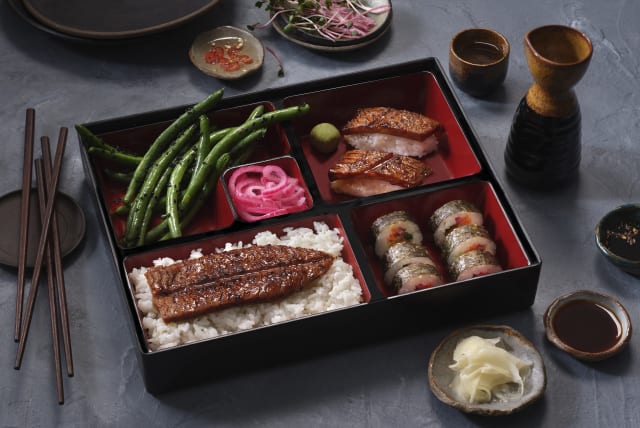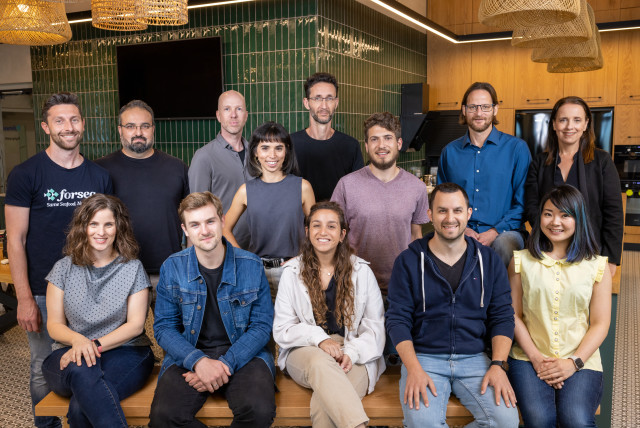Israeli start-up Forsea Ltd unveils first cultured eel for Asian chefs

By harnessing nature’s tissue formation methods, the company said it has been able to produce seafood meat by collecting stem cells from fish without causing them any harm.
Forsea Foods Ltd. of Rehovot has developed cell-cultured eels that are extremely popular in Japan and other Asian markets, and increasingly sought after in Europe and the US as well. They not only tempt leading chefs and diners, but also help save wild eel populations from extinction.
The company has just made a major move against extinction by unveiling its prototype of eels cultivated only from cells and not created from just its tissues. It successfully replicated the traditional Japanese unagi eel (Anguilla japonica) featuring the same tender, succulent texture and richly savory flavor as a natural eel. Beyond its contribution to ocean conservation, Forsea’s cell-cultivated eel offers a nutritious alternative that is free from any antibiotics, hormones, or ocean pollutants.
By harnessing nature’s tissue formation methods, the company said it has been able to produce seafood meat by collecting stem cells from fish without causing them any harm. They created a master cell bank from the cells they collected that had unique characteristics. The product is not genetically modified efficiently and cost-effectively. The price of the eels will be close to that of those caught in the seas off Japan.
“Navigating a ship called science, our team has developed a unique organoid technology that brings an entirely new approach to meat cultivation and is proud to play an integral role in creating a sustainable alternative to fishing and aquaculture, and to serve as protectors of our oceans’ rich ecosystems and immeasurable beauty,” the company said.
Not only do the cells grow quickly, but there is a significant reduction in the use of growth factors, and to bind different cell types together to form tissues and meat formats for eating is not necessary, the company added. “Our technology will feed a growing global population with delicious fish and seafood, all while mitigating the collapse of our ocean’s ecosystems.”
Unique to its proprietary method for culturing seafood is its application of organoid technology, which allows for the crafting of 3D microtissues composed of fat and muscle. These spontaneously differentiate into edible cells, mimicking the natural process of cell formation. The cell lines self-organize into tissue structures without the need for scaffold support, simplifying the production process, and enhancing scalability.
This approach should effectively overcome major industry challenges and will ease some of the supply bottlenecks for eel meat. The technology also makes possible efficient and cost-effective production of cultivated meat by significantly decreasing reliance on costly growth factors.The innovative start-up has been working together with the well-known executive chef Katsumi Kusumoto to create two popular traditional Japanese dishes – unagi kabayaki (marinated and grilled eel over rice) and unagi nigiri (grilled freshwater eel). Kusumoto runs the vegan restaurant Saido in Tokyo which was voted “the world’s best vegan restaurant” in 2019 by the online vegan and vegetarian restaurant guide Happy Cow. Forsea was the winner of the Startup Pitch Hour Prize at the Asia-Pacific Agri-Food Innovation Summit last October in Singapore.For their collaboration, Forsea contributes its novel technology for cell-cultivating eel cuts, while Kusumoto provides his culinary mastery to refine the product to perfection in texture and flavor.
“Unagi is an enduring favorite in Japan,” said Kusumoto. “Its timeless appeal, however, is impacted by a growing awareness among the Japanese population of the need to take a more sustainable approach. It’s been a thrilling journey to join forces with emerging innovators, and work together to deliver the traditional unagi indulgence with a clear eco-conscience.”
Forsea was founded in 2021 with a mission to turn the tide on the downward spiral of the ocean’s seafood populations by developing cell-cultivated alternatives, the company continued. The immense popularity of eel meat in Asia, Europe, and the US likewise poses significant challenges for suppliers who struggle to keep up with the surging demand.
“This milestone marks a major leap in our journey to deliver delicious cultured seafood products,” maintained Roee Nir, the company’s CEO and co-founder. “We are pioneering the fusion of traditional, high-quality Asian cuisine with groundbreaking technology to create the world’s first cultured unagi—one that will provide the consumer with a genuine seafood experience without putting further strain on aquatic life.”
Forsea projects that its inaugural product will be ready for commercial launch in 2025 as it seeks strategic partners in Japan (the largest consumer of freshwater eel) and across Asia. The EU and the US are also on its radar as rapidly developing markets.
Jerusalem Post Store
`; document.getElementById("linkPremium").innerHTML = cont; var divWithLink = document.getElementById("premium-link"); if (divWithLink !== null && divWithLink !== 'undefined') { divWithLink.style.border = "solid 1px #cb0f3e"; divWithLink.style.textAlign = "center"; divWithLink.style.marginBottom = "15px"; divWithLink.style.marginTop = "15px"; divWithLink.style.width = "100%"; divWithLink.style.backgroundColor = "#122952"; divWithLink.style.color = "#ffffff"; divWithLink.style.lineHeight = "1.5"; } } (function (v, i) { });

